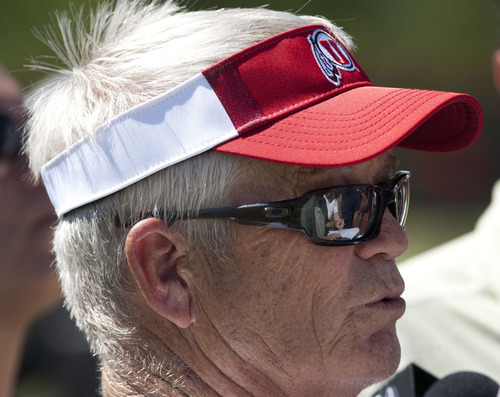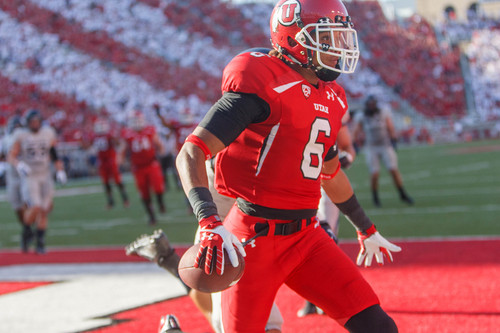This is an archived article that was published on sltrib.com in 2013, and information in the article may be outdated. It is provided only for personal research purposes and may not be reprinted.
Utah's annual Blackout promotion is being staged sooner than ever this season. For their next novelty act, the Utes should consider winning a Pac-12 football game ahead of schedule.
In two previous seasons of conference competition, the Utes haven't won prior to Oct. 27. They've lost their first four Pac-12 contests each year, before struggling opponents Oregon State and California became Blackout victims. So the Utes could radically alter the outlook of this season — and the state of their program — by beating No. 12 UCLA on Thursday night or No. 5 Stanford next week, before the calendar even reaches mid-October.
Winning those games is more optional than mandatory, which says something about where the Utes stand at the moment. It is amazing how going one year without a bowl bid has affected the view of the program. Nobody's demanding that Utah beat UCLA or Stanford, because expectations of the Utes simply are not at that level.
And yet an upset of either the Bruins or the Cardinal could change everything instantly.
At some point, the Utes will have to do something to genuinely establish themselves in this conference. They're 7-12 in league play in their third season of membership, including 4-6 at home and 3-7 vs. Pac-12 South rivals.
With those records as the backdrop, losing to UCLA and Stanford hardly would be disgraceful for Utah. The Utes would be 3-3 overall, with a decent chance of bowl eligibility and a probable opportunity against another ranked team when Arizona State visits in November.
Obviously, Utah's Mountain West era never delivered anything resembling this schedule, with the potential for three consecutive home games against Top 25 opponents. The questions that now come into play: How long will fans be satisfied with just having such teams visit Rice-Eccles Stadium? And why are the Utes incapable of beating them?
Utah's need to build depth and talent via enhanced recruiting is part of the explanation. So is the school's phase-in period of Pac-12 revenue sharing. Yet if the Utes could produce more current NFL players than half of the schools in this conference — mostly recruited and developed during their Mountain West years — why should there be a discernible gap in personnel?
Every season that goes by gives the Utes fewer excuses. Actually, there were some practical reasons for Utah's struggles in its first two Pac-12 years, mostly having to do with quarterbacking. That problem appears to be solved now, with sophomore Travis Wilson's development.
No longer are the Utes piecing together a makeshift offense or basically playing around the QB position. Besides having a genuine quarterback now, they have an experienced play-caller in Dennis Erickson. This offense is far advanced beyond the previous models, so Utah should not be overwhelmed by UCLA or Stanford.
The pressure, then, is on the Ute defense, now that the offense is doing its part. Utah cannot allow anything like the 45 points (counting a defensive touchdown) that Oregon State scored in regulation last month and expect to stay in the game.
If the defense delivers, the Utes will have a chance to do something special. This is what they signed up for, right?
The blessing and curse of Pac-12 membership are the same: Highly ranked teams will keep coming to town, representing both a wonderful opportunity and a harsh reality.
Twitter: @tribkurt





